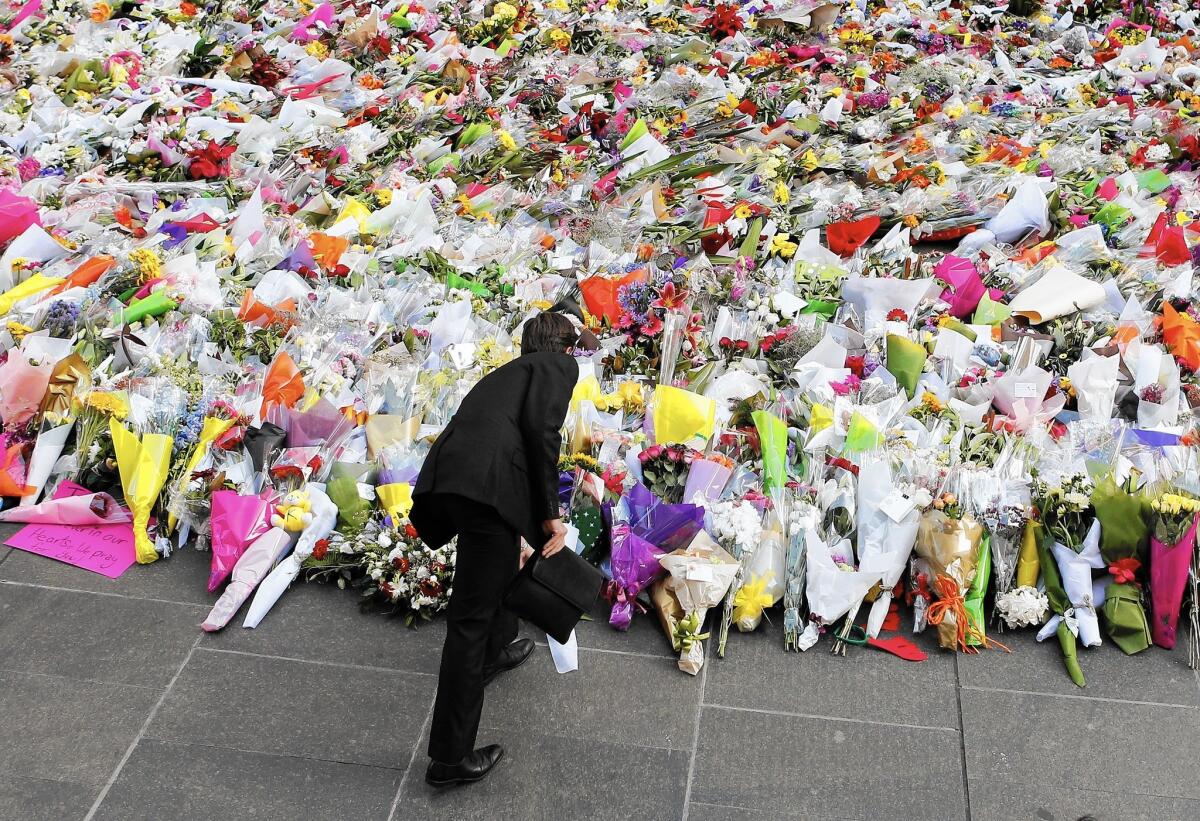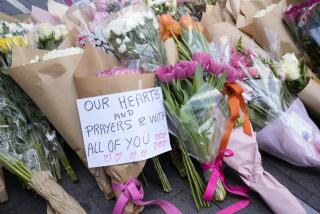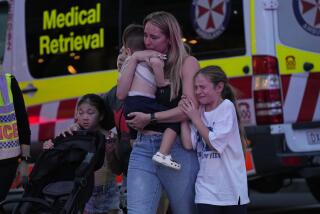Australia cafe attacker: Terrorist or just a lunatic?

Before entering the Lindt Chocolat Cafe last week, Man Haron Monis was dismissed as a loner with a large ego, a religious ideologue rejected by fellow Muslims.
In the past, the Iranian-born 50-year-old had often picked up a pen to express himself, writing countless letters seen as threatening by recipients ranging from Qantas airlines to grief-torn families of Australian soldiers who had died in Afghanistan. The belligerent missives had resulted in criminal charges, which a court had just refused to dismiss.
At the cafe, Monis carried a firearm instead of a pen. And by the time that the hostage-taking drama had concluded, the cafe manager and a customer were dead along with the self-declared cleric, who had donned a black headband indicating he was a “soldier of Muhammad.”
“He would rather die than go to prison,” said his former lawyer, Manny Conditsis. “He felt he had nothing to lose. I have got no doubt that when he went into that building [the cafe], he knew he was not going to come out alive.”
In the days since the deadly attack, debate has swirled across Australia about whether to term it an act of religious-inspired political terrorism or an aberrant action by a lunatic with a giant thirst for attention.
The discussion has hinged, for some, on fears of reprisals against Muslims. Others have warned that calling such attacks terrorism risks diverting intelligence resources from monitoring organized Islamic militant networks that might pose a greater threat.
Security analyst Neil Fergus said in the Sydney Morning Herald that classifying the attack as terrorism “would only be feeding the propaganda machine” of Islamic State and other terrorist groups. Fairfax Media’s Clementine Ford wrote that linking the attack to terrorism was racist. The Sydney Morning Herald’s editorial called it first and foremost “yet another test of our empathy.”
But others call such attitudes “denialism” in an age when Islamist extremist groups are calling for lone-wolf attacks against “infidels” from Australia to America.
“Terrorism is violence perpetrated for political purposes, and despite any personal, legal or mental problems Monis might have faced, he clearly intended this incident to be an act of terrorist theater,” said security analyst Scott Stewart of Stratfor, a Texas-based security analysis group. “Just because Monis was more of a bumbling Kramer than a deadly Carlos the Jackal does not mean he was not a grass-roots terrorist operative. Indeed … most grass-roots operatives tend to be more like stray mutts than lone wolves.”
Australians have seen several recent terrorism scares, including an 18-year-old Afghan-born man with two knives and an Islamic State flag, who lured two police officers to a meeting over his confiscated passport, slashing one and stabbing the other repeatedly; and an Afghan-born 22-year-old arrested in September on suspicion of planning to publicly execute a random Australian and drape the body in the Islamic State flag.
Author Rachael Kohn, who specializes in religious cults, warned in 2009 that Monis was dangerous after receiving aggressive faxes from him. Islamic clerics had also called for Monis, who had no known ties to Islamic State, to be investigated.
“I think people literally are in denial,” Kohn said, referring to reticence in calling his action a terrorist attack. “Part of their good intention is to not rock the boat, to not contribute to increased hostility and increased anxiety.
“There’s this desire by Australians to go back to this innocent avoidance of everything: They try to do that by not naming things and by avoiding them, thinking it will go away. It’s almost delusional to think you can strategically nuance yourself out of reality.”
Some analysts speculate that Monis’ inspiration may have been the September demand by an Islamic State official, Abu Muhammad Adnani, that supporters lure a nonbeliever and “smash his head with a rock, or slaughter him with a knife, or run him over with your car, or throw him down from a high place, or choke him, or poison him.”
“The thing that convinced me he was dangerous,” Kohn reflected, “was his production of a video, recruiting Australians for jihad, using a young woman wearing a burqa. It was really strange and quite frightening.”
Back then, Monis wrote letters to Qantas mentioning bombs and sabotage, and opined that Australian wildfire victims deserved to die.
About the same time, authorities dropped him from Australia’s terror watch list.
In 2013, he was charged with being an accessory to the murder of his ex-wife and with dozens of counts of sexual and indecent assault stemming from a period when he claimed to be a healer and dabbler in black magic.
Lawyer Conditsis represented Monis from February 2013 until early this year in cases including the poison pen letters to families of slain Australian soldiers.
Monis, he said, called them “bouquets of flowers.”
“As a result of his blindness,” the lawyer added, “being so passionate about his cause, he could not see or allow himself to see that his letters were offensive.” Monis appealed to the High Court, lost, and was sentenced to community service.
“I never had an inkling that he would be capable of doing anything like this,” said Conditsis. “He was assertive with his words, but he never ever said anything of a violent or aggressive nature to me or in front of me.”
In the cafe, Monis told his hostages they’d be dead by morning, and jumped anxiously whenever the ice maker ground into action, according to various accounts of the siege. About 2 a.m., he grew more agitated, shuffling the hostages around. When a group seized the chance and fled, it’s believed he fired a warning shot at the door.
About nine minutes later, he reportedly shot a hostage, cafe manager Tori Johnson, 34. At that point, police stormed the cafe. Monis was shot to death by police. A second hostage, Katrina Dawson, 38, was shot in the crossfire and later died.
Twitter:@robyndixonlat
More to Read
Start your day right
Sign up for Essential California for news, features and recommendations from the L.A. Times and beyond in your inbox six days a week.
You may occasionally receive promotional content from the Los Angeles Times.






